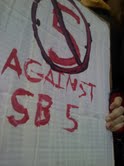Maybe I have a warped perception because I grew up in a liberal college town in Massachusetts and now I am attending the super liberal Oberlin College, but SB-5 and the similar pending changes in Wisconsin seem like a huge step backwards. I know conservatives are never big on what I consider progress, but does the November election switch from blue to red really mean that we need to move backwards? So far all the signs I have seen are pointing towards yes, yes we are taking huge steps back to an era where workers had limited rights, before progress made this an area of our countries practices that people were proud of.
On Tuesday I went to the rally in Columbus to stand in solidarity with the union workers who are facing the SB-5 bill that will eliminate most of their collective bargaining rights. These people are public servants, and yet the government that they work for is ready to strip teachers, firefighters and other public servants of their union rights. SB 5 stands to eliminate collective bargaining rights and gives the government the right to take the reigns without any checks and balances whenever they hit a "fiscal emergency"(which is most likely at government discretion). It also proposes merit pay, again at the government's discretion. At the rally I stood with about 50 Oberlin students, stood alongside firefighters holding signs that said “firefighters should be in charge of their own safety” and teachers with amusing signs that read something along the lines of “fyre the teechers, we don’t nead them!” There were security guards who simultaneously kept us out of the state house and offered their sympathy for our cause. I was very caught up in the group dynamic. I waved a sign that said “against SB-5” with as much enthusiasm as I could while also chanting, texting updates and taking notes on my surroundings. Some signs were much more amusing than mine, my personal favorite being “off with his head”, directed at Governor John Kasich. There was a homemade “United we Bargain Divided we Beg” sign, a “wall street took the money don’t blame the workers” sign that I found poignant, lots of official red white and blue “stop war on workers” signs, an overwhelming number of “Kill the Bill”, and one family holding an “SB-5 hurts families”. However, the signs were not nearly as motivating as the chants. There was an ongoing “kill the bill” chant to go along with the sign, as well as “What’s Disgusting? Union Busting!”, “The People United Will Never Be Defeated” and my personal favorite, call and response Tell me what democracy looks like? This is what democracy looks like! Show me what democracy looks like? This is what democracy looks like!”
Overall it was crowded and people were showing lots of enthusiasm but there was not a clearly identified plan or leader. The only time everyone was focused together, truly united chanting “Teddy” was when Ted Strickland took center stage, a.k.a. center steps. He took hold of the megaphone and articulated what the union workers were looking for; respect. He shouted the message to the state: “Hell no, we wont go”, and ended his speech with a rousing “power to the people.”
It was the biggest rally/protest at the Ohio state house since 1966, but this rally didn’t have a 60’s vibe. This was evident in many ways: there was but one musician with a guitar in the entire crowd, no art, and no detectable recreational drug use. This is not a social revolution. At this point we are not even idealistic enough to try to move things forward, it is enough, for now, to keep them from moving in reverse.
I was happy to chant and wave a sign for this cause, even though my emotional connection to labor unions comes 2nd hand, through the classes I have taken and the books I have read. This bill will not directly effect my life the way that some of the other aspects of progress the conservatives are trying to reverse will. At one point some Oberlin students entertained the idea of getting arrested for this cause but personally I am not close enough to the issue. It is appropriate and good for us to be there, bringing fresh energy and our opinions to the rally but I know that many students at Oberlin still don’t feel like Ohioans, myself included. I think it is important for us to show where our allegiances lie in a way that allows us to support and follow the lead of the people SB-5 is really effecting, and that is the public servants of Ohio, and the permanent residents.










